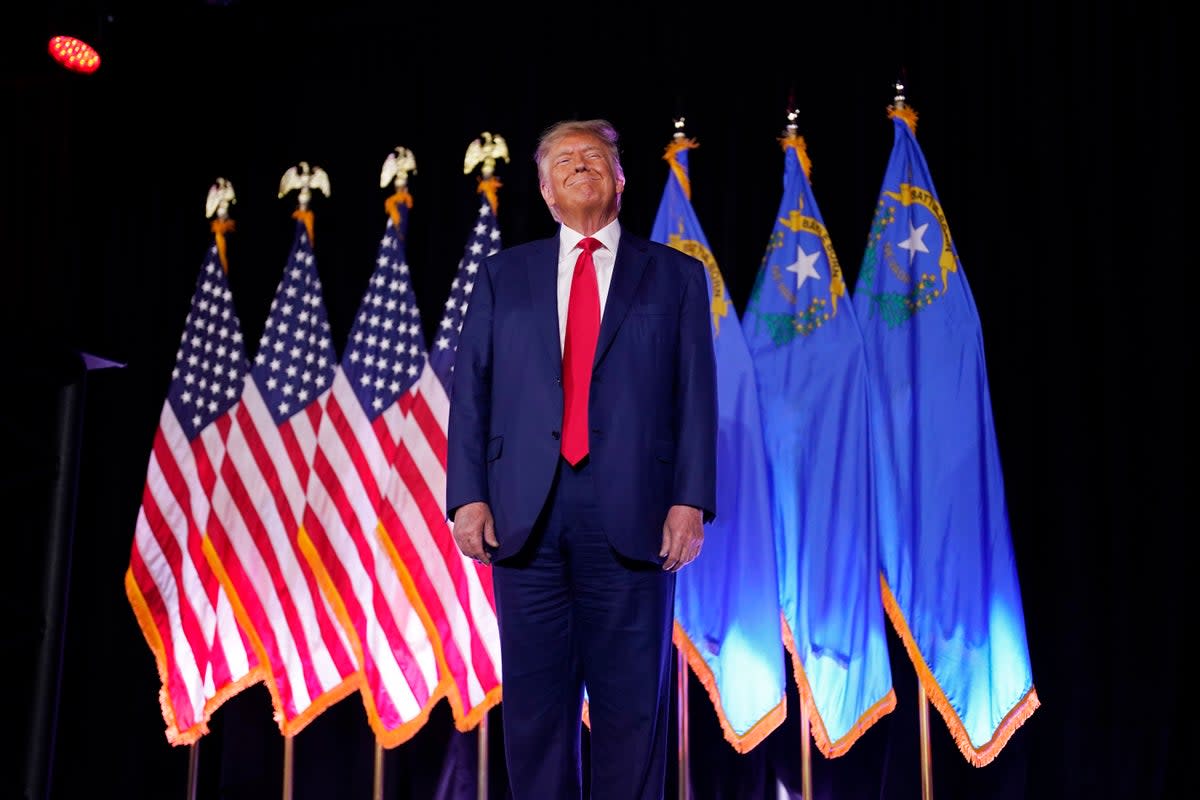Nevada Republicans have set rules for their presidential caucus seen as helping Donald Trump

The Nevada Republican Party approved rules Saturday for their presidential caucus that many campaigns suspect are meant to help former President Donald Trump win the state's GOP delegates.
The provisions would bar any candidate from the Feb. 8 caucus if they participate in the state-run primary two days earlier. They would also restrict super PACs, like the one Florida Gov. Ron DeSantis is relying on, from trying to bolster support for candidates in a caucus.
The party approved the new rules at a closed-door meeting of its central committee. Two people familiar with the matter confirmed the result to The Associated Press. The people spoke on condition of anonymity because they were not authorized to discuss the vote publicly.
The moves reflect Trump's grip on many state parties and his status as the perennial frontrunner, particularly in Nevada, where the state GOP is run by allies of the former president.
For months, the Nevada Republican Party has insisted on holding a caucus despite a state law passed in 2021 requiring state and county governments to offer a presidential primary if at least two candidates are on the ballot.
The state-run primary will occur on Feb. 6, two days before the caucus. But those results will likely be symbolic since the state party refuses to use them to determine delegates. The national Republican Party generally allows state parties to decide how they will award delegates.
The caucuses also call for voter ID, paper ballots and only same-day voting. Nevada's election laws, used in the state-run primary, require universal mail-in ballots, early voting, same-day registration, and require an ID to register to vote, but not at the polls.
The result could mean widespread confusion for Republican voters if two presidential nominating processes happen within the span of three days.
Many state Republican parties made changes to their rules ahead of the 2020 election by adding more winner-take-all contests and requiring candidates to earn higher percentages of the vote to claim any delegates. Trump has met with party chairs in Nevada, Louisiana, Pennsylvania, Florida and New Jersey.
In Michigan, where the state GOP has become increasingly loyal to Trump, the party’s leadership voted to change the state’s longtime process of allocating all its presidential delegates based on an open primary election. Now, 16 of the state’s 55 delegates will be awarded based on the results of a Feb. 27 primary, while the other 39 will be come from a closed-door caucus meetings of party activists.
Those changes, along with others in Idaho, Louisiana and Colorado, all benefit a frontrunner – in this case Trump – and has sometimes elicited intra-party strife.
The Nevada Republican Club, which says it represents about 400 members in the state, sent a letter to local GOP officials this month urging them to speak out about the potential problems with the state having both a primary and a caucus and to defeat the proposed rule changes.
Michael McDonald, the chair of the Nevada GOP who was a fake elector for Donald Trump in 2020, had previously told The Associated Press that the party pushed the caucus since Democrats in the state Legislature did not consider Republican Gov. Joe Lombardo’s election integrity measures, particularly voter ID.
“Nevada is currently missing Voter ID, transparent tabulation in elections, precinct-based voting, and we see our streets and trash cans flooded with unsolicited mail in ballots,” McDonald wrote in his call to action before the meeting. “I will NEVER give up the fight for free and fair elections.”
Jim DeGraffenreid, a Republican National Committeeman for the Nevada GOP, previously called the idea that Nevada’s process is skewed for Trump “one of the most ridiculous things that I think I’ve ever heard.”
“It appears that Donald Trump is the last person that needs a thumb on the scale,” DeGraffenreid said, citing the former president’s polling and fundraising strength. “It is not in our interest to rig anything for anyone, especially for someone who apparently doesn’t need to have anything rigged for him.” ___
Michelle L. Price contributed reporting from New York. Stern is a corps member for The Associated Press/Report for America Statehouse News Initiative. Report for America is a nonprofit national service program that places journalists in local newsrooms. Follow Stern on X, formerly Twitter: @gabestern326.


